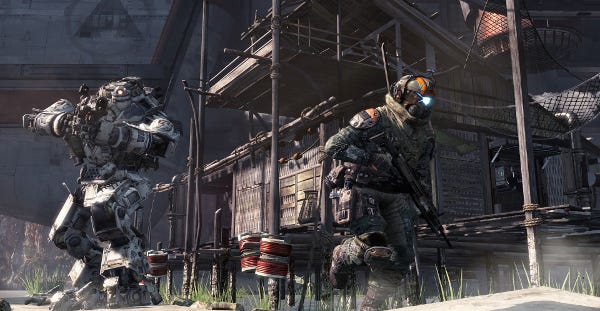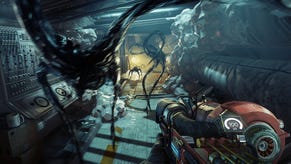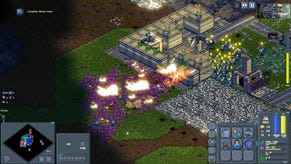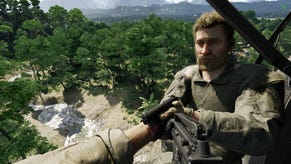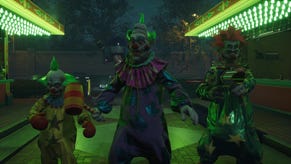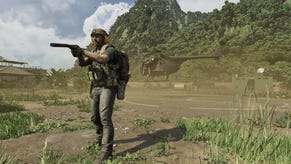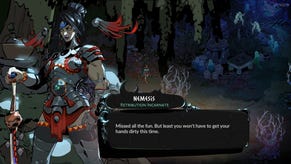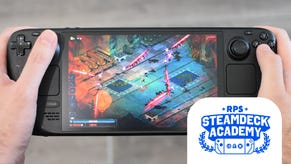Respawn On Titanfall, Departing From Call Of Duty
Infinity Wars
After eons of hush-hush legal drama and remarkably silent tinkering, Respawn Entertainment finally revealed Titanfall during E3. Gone are the rah-rah-rah military men - neck veins like titanium from a lifetime of barking orders - replaced by futuristic commandos and the mechs who love them. Or at least nearly bro-fist them into their cockpits. There's some unintentional silliness involved, to be sure, but this one actually looks rather promising. It has agile, Hawken-esque mechs, fleet-footed infantry, a campaign that intriguingly fuses single-player and multiplayer, and - tornado hurricane sigh of relief - it's not a Windows 8 exclusive. But how exactly does all of that come together? And how far along could the game actually be given that it was caught in the crossfire of a legal battle between Respawn and Infinity Ward until not too long ago? I spoke with Respawn's Joel Emslie to find out.
RPS: Titanfall's not a modern or near-future military shooter. I think that, alone, surprised some people - even after all the Infinity Ward departure drama. Why'd you pick this idea and setting?
Emslie: Well, I think we sat down and said, "OK, everything that we've all done in the past... let's just try to do something as different as possible from that. Get away from it. We're fatigued from all [the modern military stuff]." Respawn is 50 percent brand new talent, too, so we all just got in and tried to come up with something new.
The real concept is, "Try to do something new, but build a bridge [from our previous works]. That's really hard to do. We love multiplayer, and we had to build it from scratch. We're working with a heavily modified version of the Source engine, so we had to go in there and really tweak things. We took a lot of the guys from the team to the gun range and got them to feel the guns. "More like this, more like that."
The other thing we went after is the frustration with how fast you die in a lot of modern multiplayer shooters. It's gotten to the point where you drop into a multiplayer match in some games, and you just get headshotted immediately. You just get dropped. There's no chance. So we started experimenting with that, but without being cheap and turning people into bullet sponges.
So the concept of putting people in hard shells and trying to make that cool and giving them a second chance, we started messing around with that. The first iteration was a dude in a suit - like a diving suit. But then it quickly grew into this thing where it was like 20 people designing levels that could support both [human and mech] scales, which is crazy. Just getting the FOV of the camera to feel right and everything [was a challenge].
The other side of the game was making sure that pilots could interact well with mechs. We had to make sure the pilot could catch up, that the mech wasn't moving too fast but also not too slow. Then we had to make sure the pilot could have the maneuverability and agility to take these things head-on.
So we took that core combat loop and experimented with it hard. It took a crazy long time to get right.
RPS: You said you wanted to move as far as possible from your previous works with Titanfall. Was there ever a point where Respawn's first game wasn't a shooter?
Emslie: I think that, when you're just starting out and you have a crew of people with a talent for doing a particular thing really well, it's good to try to pursue that. We have a DNA within the crew, and we played that card. We went for it. So there's a lot of ideas on the shelf for Titanfall that we haven't gotten to yet. Some of them go way out, and some of them come closer into the FPS genre.
Really, for the designers, doing something different meant, "Let's not just do the same old single-player/multiplayer dynamic. Let's try to integrate this stuff." Which is incredibly difficult. To try and have AI in the multiplayer game space takes tons of work. We have skits happening. You can go into rooms and see pilots fist-fighting. You can help a guy if you want to. The AI is written in such a way where it really acknowledges the players. It acknowledges good and bad. You can come in [to where your guys are] and you'll get a fist bump. Or enemies might see you in a Titan, and they'll kind of stumble and run away from you. They get intimidated.
RPS: Relative to Call of Duty, what's your typical map size like? It still looks a bit confined compared to, say, Battlefield, but it seems like the mechs also necessitate some pretty wide open spaces.
Emslie: The beauty of mixing your multiplayer and bringing single-player in there is the fact that the crew isn't jockeying for resources [between the two modes]. Everyone gets everything. So, with that said, the map sizes are really dependent on the type of story we're telling with that map. Multiplayer campaign tells the story from both sides. We've shown a thing for the Fracture map where you're seeing it from the militia side and you're in a dropship coming down, but that's just one scenario. We have others as well, and the map will expand and contract based on that.
But really, it's about trying to get it so that players can maneuver in and get a cat-and-mouse thing going. Also, not making it so densely packed that [it becomes unmanagemable]. With AI grunts plus player characters and Titans, it'd just be annoying at that point.
RPS: Have you tried to beef up infantry characters as well? Make them less quickly killable - especially with all those mechs running around?
Emslie: What we're showing right now is not really a shield, but it's a regenerative bit of health. There's lore behind that in the game that we'll go into later.
RPS: Has the team done much research on Splash Damage's Brink? It had a very similar goal - meld single-player and multiplayer while telling a big, ever-evolving story - but it produced middling results at best.
Emslie: Well, we play everything. There's some hardcore gamers in the office, there's some casual gamers. But the entire team as a whole has a voracious appetite for games, and we're always drawing inspiration.
RPS: But Brink had longevity issues that I think could crop up here as well. What happens when players finish the story? Is the story just a shell for the traditional multiplayer grind of unlocking and posting 1080 no-scope dubstep videos to YouTube?
Emslie: There are definitely other modes that we're gonna go into detail on later. Right now, there are two sides that we're showing: the sports side, which you can probably easily see happening already, and there's our multiplayer campaign side.
We'll go into more detail on [the longevity issue] later, because I think it's a really good question, but it should be answered properly. When we can really break it down in detail.
RPS: At Infinity Ward, you guys pretty much pioneered the modern videogame setpiece with Call of Duty. Will Titanfall go for any super scripted moments of pure ridiculousness, or are mechanics the main focus here? Because to be frank, lots of scripting seems like it'd be pretty annoying in a game like this.
Emslie: We're stepping away from that stuff as best we can. Honestly, though, we have huge scripted single-player moments happening in multiplayer. The current demo has an intro and an outro, and we can go further with that. More details to come.
RPS: Is there any pressure to top what you did with Call of Duty? Coming from the game development studio meltdown of the century - and a creatively motivated one, to boot - do you feel like you have something to prove?
Emslie: The pressure we put on ourselves is, we're a start-up. It's really hard to be at a start-up and survive and ship a game. That's the pressure we feel. We're also doing a brand new IP that no one ever heard of prior to these last few days. So we put pressure on ourselves to make Titanfall a success and keep our company going. That's the goal.
RPS: After all that craziness, how long did it take you all to get back into a place where you could just make a game? I mean, the game looks nice, but is it really all that far along?
Emslie: On day one we were doing it. Like I said, there were other people that weren't dealing with old stuff, old drama. It helped once we finished the lawsuit. When we were done with that stuff, it was a big relief. But the whole time we were in the middle of that, the crew was business as usual, miring away. Doing that in our spare time.
When we first began, we were essentially squatting. We hadn't worked out a lease yet. So the first year of Respawn was really just getting our bearings, getting our tech together. Then we developed an idea and pursued it. So we've been around for just over three years, and Titanfall is the result of maybe a year-and-a-half or two years of just heavy thinking and experimentation. It's only been hardcore development toward the end here, leading up to E3.
RPS: [PR then informs me that I'm out of time, and I spill hot tears all over my remaining questions about things like mech customization and modding.] Thank you for your time.
